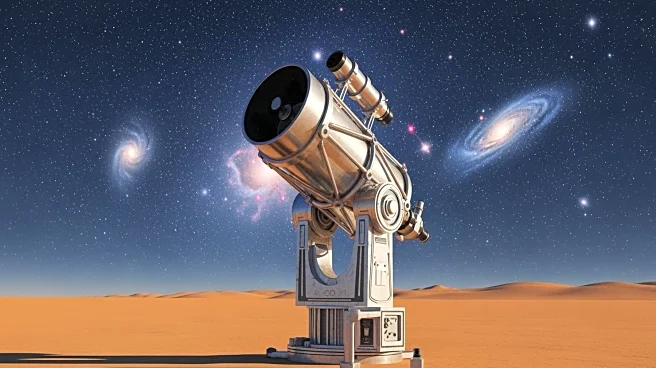What's Happening?
A team of international scientists has utilized the Murchison Widefield Array telescope in Western Australia to study the universe's conditions during the 'epoch of reionization,' a period occurring about
one billion years after the Big Bang. This era marked the transition from the 'cosmic dark ages,' when the universe was filled with neutral hydrogen, to a state where hydrogen atoms became ionized due to UV light from the first stars. The study, published in The Astrophysical Journal, suggests that the reionization did not start cold, as previously theorized, but involved heating likely caused by black holes and stellar remnants approximately 800 million years after the Big Bang. The researchers, led by Cathryn Trott from Curtin University, used a decade of data to determine that the universe was not as cold as expected during this transition.
Why It's Important?
Understanding the conditions of the universe during the epoch of reionization is crucial for astrophysics, as it provides insights into the formation and evolution of galaxies and stars. The findings challenge previous theories suggesting a cold start to reionization, indicating that early heating played a significant role. This discovery could reshape scientific models of cosmic evolution and influence future research directions. The study's implications extend to the broader field of cosmology, potentially affecting how scientists interpret the universe's early development and the role of black holes and stellar remnants in cosmic heating.
What's Next?
The research team plans to continue refining their data and methods to isolate the signals of early heating more clearly. As they improve their techniques and gather more data, they aim to identify the specific signals associated with the heating caused by x-rays from early black holes and stellar remnants. This ongoing research could lead to more precise models of the universe's early conditions and further understanding of the processes that shaped the cosmos during its formative years.
Beyond the Headlines
The study highlights the challenges faced by astrophysicists in uncovering evidence from the universe's distant past. The need to filter cosmic noise and isolate specific signals underscores the complexity of such research. Additionally, the findings may prompt ethical discussions about the allocation of resources for space exploration and research, considering the vast investments required for such scientific endeavors.










